120 videos match your search.
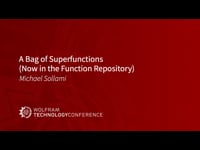 |
Michael Sollami This presentation is a discussion of this specific user's participation authoring and submitting functions for the Wolfram Function Repository, including examining use cases, some function history, and practical, real-world applications. |
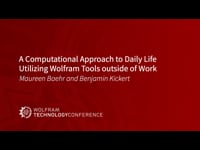 |
Maureen Baehr and Benjamin Kickert Mathematica and the Wolfram stack are well-known tools within professional settings from academia to the private sector. But how can these tools be leveraged to make life outside the office ... |
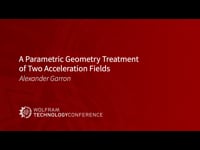 |
Alexander Garron This paper uses Euclidean Parametric Geometry to demonstrate Kepler's Empirical #2 as Conserved Mechanical Energy and Sir Isaac Newton' s displacement radii to construct changing shape of motive energy curves demonstrating ... |
 |
Carol Johnstone Though accelerators represent a $500B industry, development of advanced and ultra-compact accelerator applications has been stymied due to dated or difficult-to-use design tools with limited optimization algorithms. This presentation covers ... |
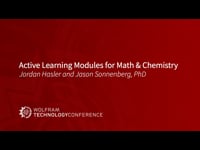 |
Jordan Hasler and Jason Sonnenberg, PhD This talk demonstrates various ways Wolfram|Alpha Notebook Edition can be used in introductory mathematics and chemistry courses to encourage concept exploration and visualization. New features are highlighted using standalone ... |
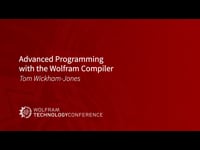 |
Tom Wickham-Jones The Wolfram Compiler converts Wolfram Language into native machine code and provides a faster execution path as well as many opportunities for innovative programming features. This talk covers advanced programming with the Wolfram Compiler, focusing on performance computing and showing the latest features that work ... |
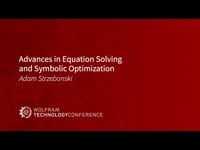 |
Adam Strzebonski Recent and upcoming releases of Mathematica include significant functionality extensions in functions for finding exact solutions of systems of equations and inequalities and for solving exact optimization problems. The extensions ... |
 |
Itai Seggev This talk surveys multiple changes made to Mathematica up to this point to make the software an even better tool for introductory mathematics instruction. |
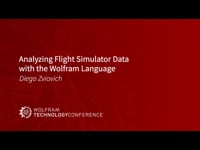 |
Diego Zviovich Microsoft Flight Simulator™ has been with us since the early '80s. We will show how the Wolfram Language can be used to pull simulation data from this fabulous game ... |
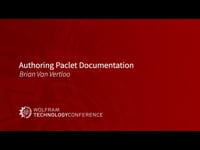 |
Brian Van Vertloo |
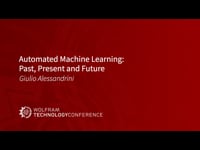 |
Giulio Alessandrini Machine learning superfunctions like Predict and Classify have tried to bridge the gap between beginner and specialist Wolfram Language users by offering a fully automated yet customizable pipeline. Over time, ... |
 |
Peter Barendse, Daniel McDonald, Jack Heimrath and Xiaofan Zhang We present updates to the automated geometric functionality of the Wolfram Language introduced in Version 12 and display new functionality for automated geometric reasoning. |
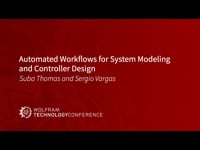 |
Suba Thomas and Sergio Vargas Wolfram Language has been enhanced to better integrate system modeling and automate and streamline subsequent controller design and simulation. This talk presents these developments along with System Modeler application examples ... |
 |
Oliver Grasl Automating state-of-the-art, multichannel content creation and delivery is a sophisticated and involved process. This presentation illustrates how Wolfram technologies can be used to pull content from diverse sources such as ... |
 |
MinHsuan Peng |
 |
Paritosh Mokhasi This talk focuses on generalizations of the convex optimization algorithms that allow us to solve a much broader category of problems. We discuss the construction of generalized convex functions and ... |
 |
Jon McLoone This talk demonstrates a web-based application designed to automate the performance of DSE reviews built using Wolfram Application Server, explains the application architecture and discusses issues such as user authentication, ... |
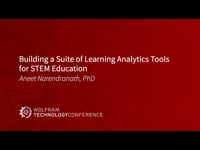 |
Aneet Narendranath, PhD This is a demonstration of some of the early development in learning analytics tools for STEM education. The demonstration describes early results from these tools' deployment in a real classroom ... |
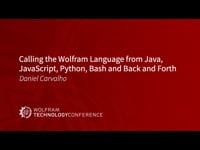 |
Daniel Carvalho This talk shows examples of how Wolfram Language can communicate dynamically with other popular programming languages and how to easily integrate Wolfram technology to create innovative resources and automation. |
 |
Robert Nachbar This talk describes the development of the idea of using combinators to model chemical structures and how to use Wolfram Language to get there. |